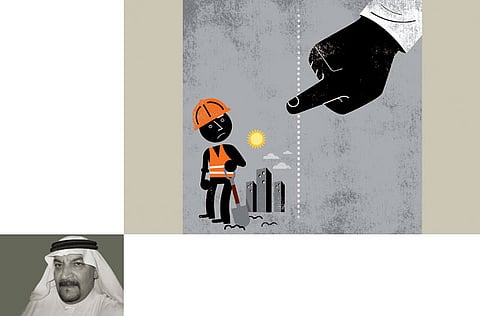Perils of a guest labour force
These workers are a silent and rarely acknowledged army of people

Whenever an incident concerning an unskilled expatriate worker involved in a crime is reported in the press, it is usually followed by calls warning against the threat of these people among our society. After reading enough of these generalised warnings against the unskilled and semi-skilled expatriate workforce in Saudi Arabia, I have to ask this question: Can we really get by without their presence?
Before I answer that question myself, let me list some of the activities these workers are engaged in. To begin with, our municipal workers are exclusively comprised of large numbers of expatriates industriously engaged in keeping our roads and cities clean, and our trash carted away. As our cities strain from a growing population, so does the amount of litter and rubbish that has to be catered to, and it is being judiciously done by the guest worker.
Our booming construction industry has necessitated the need for large numbers of semi-skilled expatriate workers. Some load cement in mixers, others shovel and dig, and still some prepare the ground for the foundations on which structures would rise. Many are perched precariously high on the scaffolds around high rises, daily placing their lives at risk. For them, there is no safety net of comprehensive medical insurance, and working conditions often hover above 40 degrees Celsius with a high humidity factor.
Our streets and roads are under a constant state of rework for laying out a sewage network. Guess who is primarily involved in the actual digging and setting of the massive pipes for these projects? It certainly isn’t any Saudi that I know of.
Quietly efficient
Trees get pruned and grass in public parks cut and watered diligently by the migrant worker. The waste from our septic tanks is flushed out and carted off in tankers by operators primarily from African countries. And owing to the highly inefficient water distribution network, potable water to our homes is being delivered by tankers driven by Asians.
When we have to get around and use taxis or limousines, we are usually carted around by expatriate drivers. And when our personal vehicles need to be serviced or repaired, they are generally accomplished by other expatriates.
As we shop for our groceries it is the Asian who bags our purchases and delivers them to our cars. And around the house, if there is a need for plumbing or electrical work, guess who is available to do the job and without much fuss? Want to install curtains or re-upholster your furniture? There are plenty of expatriates who will do the work quickly and effectively.
Our factories and other industries employ a large number of expatriate workers, often resigned to pitiful living and working conditions and very low wages, but yet the job gets done without complaint. In some cases, their circumstances are an affront to the human rights defined in our religion. The list can go on and on, but the point I am trying to get across is this: Most of these tasks are being undertaken by expatriate workers because Saudis have shown no inclination to do them. These workers are not taking jobs away from Saudis, but instead are performing a service essential to all of us and in most cases they are doing them well.
And so to the growing legion of Saudi writers and commentators who are quick to point our ills in the direction of this group of workers I ask; where would we be without them?
A little appreciation
Let us not delude ourselves into believing that Saudis today would readily fill in these posts and professions. One would not stumble upon a sizable number of Saudis queuing for such professions held by these expatriate workers.
Instead of criticising their presence, let us appreciate their contributions. Many leave homes and families behind to eke out a meagre existence and save a little every month to send home. Many are subjected to deplorable living conditions, their rights violated in every form and yet they remain faithful to the task uninterrupted and without protest. They stick to themselves, rarely intrusive and more often abused. And if there are a few miscreants among them who get into criminal activities, are not some Saudis guilty of the same? To wholly target any group or nationality for the misdeeds of a few among them is gross injustice.
Should we not get off our high pedestals and recognise that they really are of no threat of any form to our society? The real threat lies in the lazy and sluggish attitude exhibited by some of our Saudi work-force whose expectations of salary and benefits far exceed their abilities.
Let me assure all who call for vigilance against the guest workers. They are not a menace or a threat, but a silent and rarely acknowledged army of people that oils the machinery which runs the rest of us. Let us instead show some gratitude for their presence.
Tariq A. Al Maeena is a Saudi socio-political commentator. He lives in Jeddah.
Sign up for the Daily Briefing
Get the latest news and updates straight to your inbox



